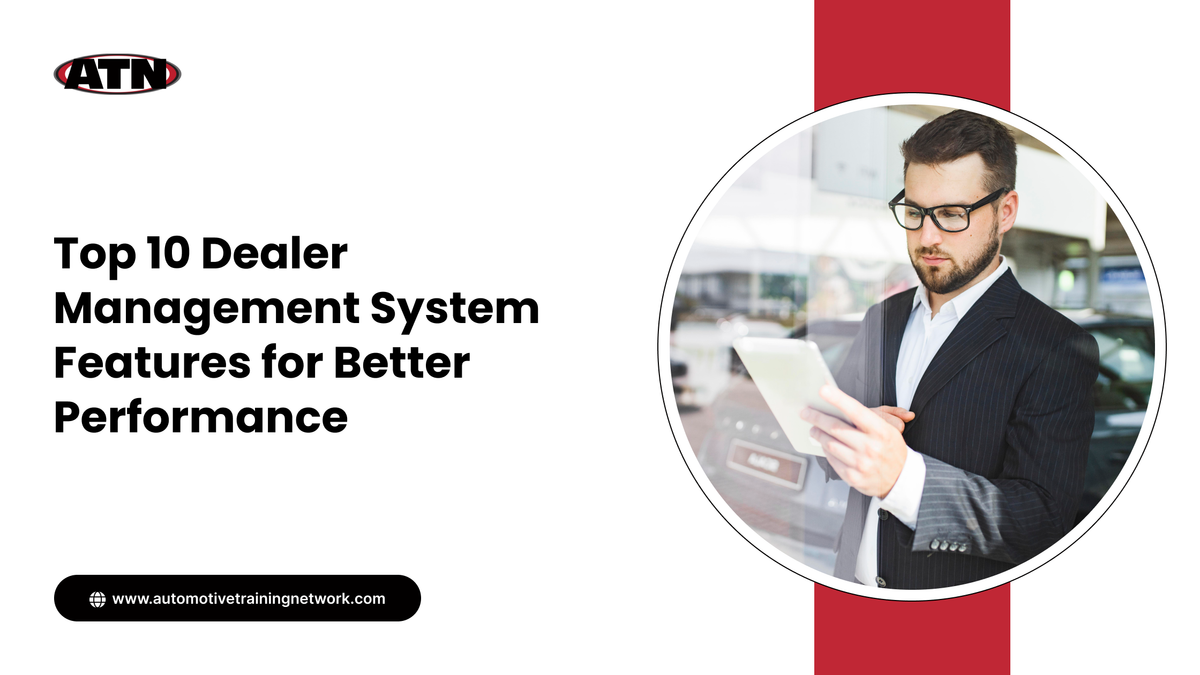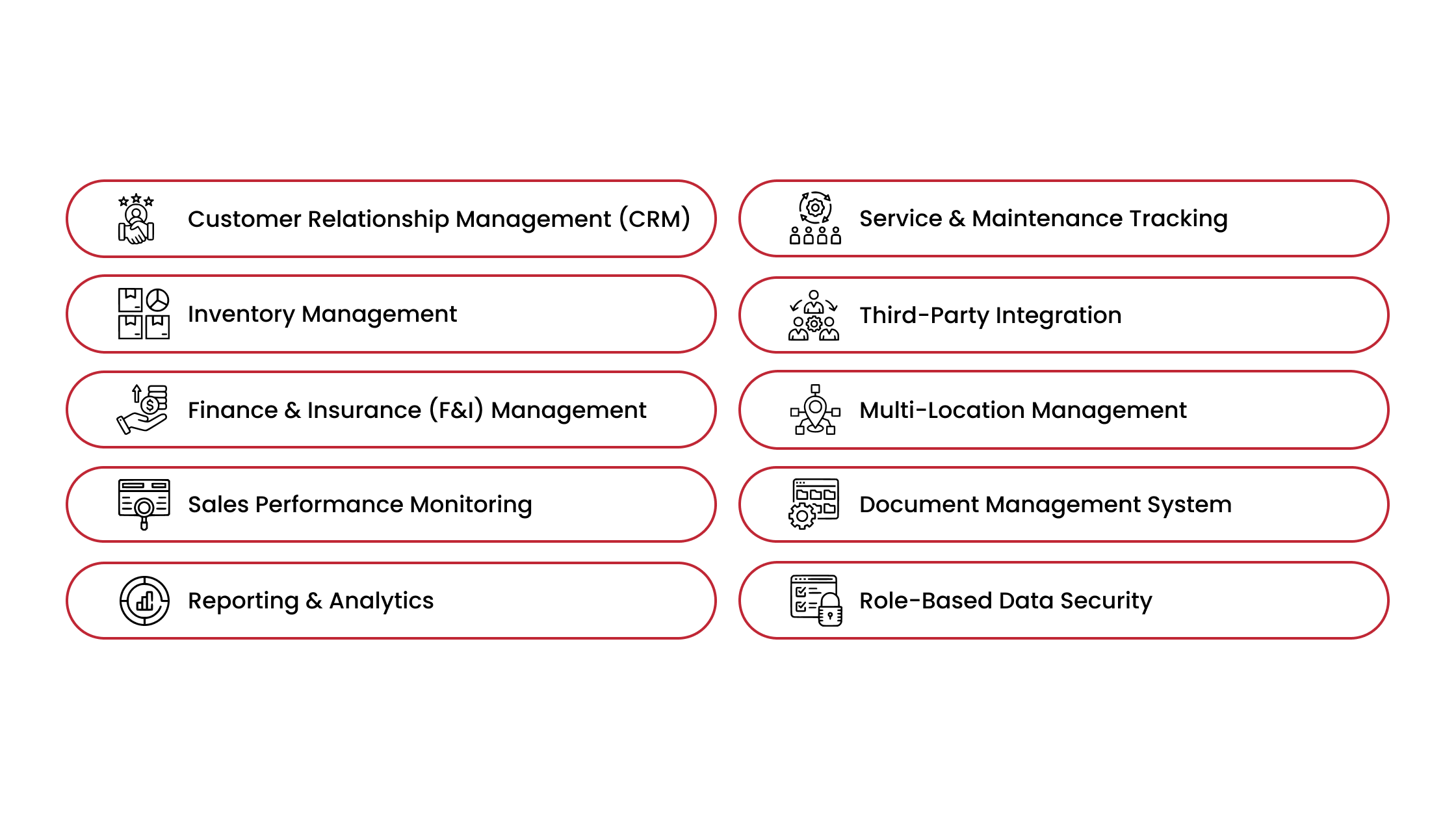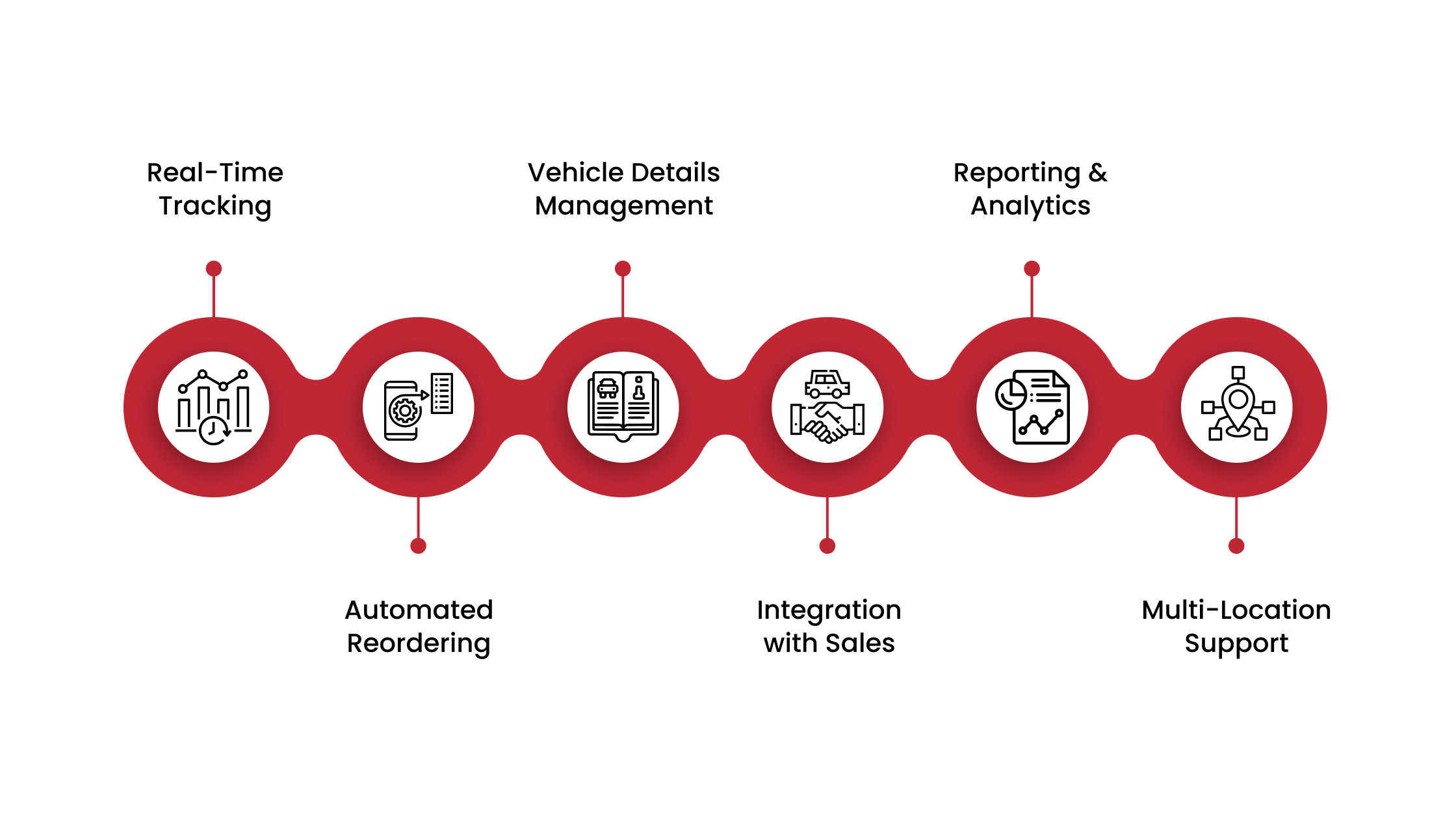Top 10 Dealer Management System Features for Better Performance

Margins are shrinking, customer expectations are rising, and every department in your dealership is under pressure to perform. Yet many dealers still rely on outdated processes or patchwork software systems that don’t “talk” to each other. The result? Missed opportunities, frustrated customers, and wasted time.
A recent survey revealed that 56% of dealerships struggle with data gaps and discrepancies between their CRM, DMS, and finance systems at least once every quarter. These gaps create blind spots that hurt decision-making and slow down your entire operation.
The right Dealer Management System (DMS) changes that by giving you a single platform to manage sales, service, accounting, inventory, and customer relationships with complete accuracy. But not all DMS platforms are created equal.
In this blog, we’ll break down 10 must-have dealer management system features you can’t ignore, the resources that will keep your dealership running efficiently, profitably, and ahead of the competition.
Why the Right DMS Matters?
The right dealer management system can be the difference between a dealership that thrives and one that struggles to keep up. Without the proper methods, your team ends up juggling multiple disconnected platforms for sales, service, parts, and accounting. This leads to inefficiencies, errors, and missed opportunities that eat into profitability.
A DMS with comprehensive, integrated features allows you to:
- Centralize data from all departments for real-time visibility.
- Improve customer experience by reducing delays and errors.
- Streamline everyday tasks so your staff can focus on revenue-generating activities.
- Make better business decisions using accurate, up-to-date information.
- Assists with dealership expense control
When evaluating dealer management system features, it’s essential to look beyond the basics and identify the methods that will help you overcome your specific operational challenges.
10 Must-Have Dealer Management System Features

Here are the dealer management system features every dealership should prioritize. These capabilities ensure smoother operations, better customer experiences, and stronger profitability.
1. Customer Relationship Management (CRM)
Customer Relationship Management is a critical dealer management system feature that empowers dealerships to build and maintain meaningful connections with customers throughout their buying and service journeys.
A powerful CRM centralizes all customer data, from contact information and vehicle history to communication logs and appointment schedules, enabling teams to deliver personalized experiences and timely follow-ups.
Common benefits of a CRM feature include:
- Lead Management: Capture, route, and prioritize leads efficiently to ensure timely follow-up.
- Communication Tracking: Log emails, calls, and messages in one place for a complete customer history.
- Appointment Scheduling: Automate test drive bookings and service visits with reminders to reduce no-shows.
- Customer Segmentation: Group customers by preferences, purchase history, or demographics for targeted marketing.
- Follow-up Automation: Use task plans and alerts to ensure consistent outreach and improve conversion rates.
- Performance Reporting: Monitor sales pipeline health and customer satisfaction metrics to optimize team efforts.
By integrating CRM within a dealer management system, dealerships improve operational efficiency and customer satisfaction, ultimately driving more sales and repeat business. ATN’s expert coaching helps sales and service teams master CRM workflows, enabling personalized follow-up and higher conversion rates.
2. Inventory Management

Inventory Management is one of the dealer management system features that helps dealerships keep accurate, real-time records of their vehicle stock and parts inventory. Effective inventory management ensures the right vehicles and parts are available when customers want them, reducing delays and lost sales opportunities.
Components of inventory management include:
- Real-Time Tracking: Monitor new and used vehicle stock levels, locations, and status updates instantly.
- Automated Reordering: Set thresholds for parts and accessories to trigger automatic reorder notifications or purchases.
- Vehicle Details Management: Store comprehensive data such as VIN, make, model, year, color, pricing, and condition.
- Integration with Sales: Sync inventory data with sales and CRM systems to reflect up-to-date availability.
- Reporting & Analytics: Generate reports on turnover rates, aging stock, and profitability to inform buying decisions.
- Multi-Location Support: Manage inventory across multiple dealership locations with centralized visibility.
With efficient inventory management integrated into the dealer management system, dealerships can optimize stock levels, minimize carrying costs, and improve customer satisfaction by ensuring quick access to the right vehicles and parts.
3. Finance & Insurance (F&I) Management
Finance & Insurance (F&I) management is a crucial dealer management system feature that streamlines the financing and insurance process for vehicle purchases. It automates credit applications, loan approvals, and insurance sales, speeding up transactions and reducing errors. This feature also helps dealerships stay compliant with regulatory requirements by managing disclosures and contract documentation efficiently.
Real-time reporting provides insights into F&I product performance and commission tracking, supporting profitability. By integrating F&I with sales and other departments, dealerships create a seamless customer experience, improve internal coordination, and boost revenue through effective financing and insurance solutions.
ATN’s finance training enhances your F&I department’s efficiency and compliance, helping maximize backend profits while delivering superior customer experiences
4. Sales Performance Monitoring
Sales tracking allows dealerships to monitor and analyze every stage of the sales process. From the initial customer inquiry to the final sale, this functionality captures data on lead sources, salesperson activity, and deal status. By having real-time visibility into sales performance, managers can identify bottlenecks, measure individual and team productivity, and forecast future revenue more accurately.
Additionally, sales tracking supports data-driven decision-making by providing detailed reports on conversion rates, average deal size, and sales cycle length. This empowers dealerships to optimize sales strategies, improve customer engagement, and ultimately increase profitability.
5. Reporting & Analytics
Reporting and analytics are some of the most crucial dealer management system features that provide dealerships with actionable insights to drive better business decisions. These tools collect and analyze data from various departments, sales, service, inventory, and finance, offering a comprehensive view of dealership performance.
Major benefits include:
- Real-time dashboards displaying KPIs for quick performance assessments
- Customizable reports to track sales trends, customer behavior, and operational efficiency
- Identification of growth opportunities and areas needing improvement
- Enhanced forecasting accuracy through historical data analysis
- Support for strategic planning by monitoring market shifts and competitor activity
By utilizing reporting and analytics, dealerships can make informed decisions that enhance profitability and customer satisfaction.
6. Service & Maintenance Tracking
Service and maintenance tracking helps dealerships efficiently manage all aspects of vehicle servicing. This functionality allows service departments to schedule appointments, track repair orders, and monitor vehicle maintenance history in one centralized platform.
With service and maintenance tracking, dealerships can:
- Automatically remind customers of upcoming service needs to improve retention
- Access detailed records of past repairs, parts used, and technician notes
- Streamline workflow by coordinating service bays, parts inventory, and labor scheduling
- Enhance customer experience through timely updates and transparent communication
- Identify common service issues and optimize preventive maintenance programs
By keeping service operations organized and transparent, dealerships boost customer loyalty and increase service department profitability.
7. Third-Party Integration
A dealer management system’s ability to integrate seamlessly with third-party applications is crucial for streamlining operations across departments. This feature enables dealerships to connect their DMS with external tools such as accounting software, marketing platforms, credit bureaus, parts suppliers, and digital retailing solutions.
Integrations eliminate the need for manual data entry and reduce errors by synchronizing information automatically between systems. For example, linking a DMS with a CRM or marketing automation platform allows sales and service teams to coordinate campaigns and follow-ups more effectively. Likewise, integration with finance and insurance providers speeds up loan approvals and insurance processing.
By ensuring smooth data flow and cohesive workflows, integration with third-party applications enhances operational efficiency, improves data accuracy, and enables dealerships to deliver a more connected customer experience.
8. Multi-Location Management
For dealerships operating multiple rooftops, managing all locations from a single platform is essential. Multi-location management within a dealer management system allows centralized control over inventory, sales, service, and reporting across every dealership site.
This feature provides consistent processes and data visibility regardless of geographic spread. Managers can monitor performance metrics, compare results between locations, and allocate resources efficiently to meet demand. It also simplifies administrative tasks like pricing updates, promotions, and compliance tracking by pushing changes across all stores simultaneously.
With multi-location management, dealerships maintain operational consistency while empowering each location to respond quickly to local market conditions. This scalability supports growth and helps keep all parts of the business aligned toward common goals.
9. Document Management System
Eliminate the hassle of handling paper files with a robust document management system. This feature enables dealerships to:
- Digitally upload and securely store vehicle and customer documents
- Support electronic signatures for faster processing
- Receive automatic alerts for document expirations, such as insurance and registration
- Access documents quickly through searchable archives
By streamlining document handling, dealerships save valuable time, enhance regulatory compliance, and minimize the risk of manual mistakes.
10. Role-Based Data Security
A dealership handles sensitive customer data, financial information, and employee records, making role-based access and system security a non-negotiable DMS feature. A modern dealer management system should allow granular user permissions, so employees only access the information relevant to their role.
Major capabilities include:
- User-level access controls to prevent unauthorized data exposure
- Secure login authentication and activity tracking
- Data encryption and compliance with regulatory standards
- Automated backups and disaster recovery protocols
Strong security infrastructure protects your dealership from breaches and data loss, and builds trust with customers while ensuring regulatory compliance across departments.
Having the right resources is essential, but knowing how to apply them across departments is what drives real results. ATN helps dealerships turn planning into daily performance.
Train Every Department at Your Dealership for Maximum Efficiency with ATN

A comprehensive dealer management system with the right features is essential for increasing sales and enhancing customer satisfaction in the competitive automotive market. Implementing these 10 must-have dealer management system features will empower your dealership to streamline operations and stay ahead of evolving industry demands.
Automotive Training Network (ATN) offers complete dealership management solutions to optimize every department and elevate your dealership’s overall performance. With decades of experience and a proven track record, ATN provides expert training and management programs tailored specifically for automotive dealerships.
What ATN Brings to Your Dealership:
- Over 12,000 dealerships served with customized training and management solutions
- A dedicated team of six specialists covering sales, fixed operations, digital marketing, branding, and project management
- Expertise in CRM workflows, inventory strategies, and financial analysis
- Regular coaching sessions to set and achieve monthly targets
- In-depth revenue and advertising spend reviews to maximize profitability
- A blend of virtual and onsite support tailored to your dealership’s needs
Contact ATN today to learn how our complete dealership management program can help you increase sales, improve efficiency, and build a stronger, more profitable business

